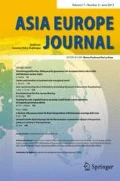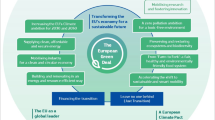Abstract
The western Balkans as a region is at the crossroads of the east-west energy transportation routes, and it is confronted with the simultaneous tasks of transforming its economic outlook and its energy infrastructure: a process that creates unique opportunities as well as challenges. By confronting these challenges and making the best use of its opportunities through sound decision-making, the region could significantly improve energy security. The transformation of the dynamics of energy security in the western Balkans is an opportunity not only for the region but also for the countries like Turkey, which is rapidly becoming an important player in the east-west energy supply corridor. While much of the literature focused on energy security and the region has explored its relations with Russia and the EU, this article expands and enhances knowledge of this topical subject by exploring the highly important position Turkey occupies in the region’s energy security dynamics. For reasons both specific to Turkey and to its particular sets of interconnected relationships with the EU and Russia, the article demonstrates that Turkey is uniquely situated to contribute to energy security in the western Balkans. The major aim of this study is thus to provide a clear understanding of Turkey’s energy policy in the western Balkans in light of its own relations with the two key players of EU and Russia, as well as its particular domestic-level characteristics. The fundamental argument is that Ankara, with its proactive diplomacy and advanced bilateral partnerships with Russia and the EU, is particularly positioned to contribute—and has the capacity to continue to contribute—to the future of energy security in the western Balkans.
Similar content being viewed by others
Notes
High energy intensities indicate a high price or cost of converting energy into GDP.
A household is said to be in fuel poverty when its members cannot afford to keep adequately warm at reasonable cost, given their income.
References
ANSA (2013) Serbia And Turkey Team Up for Energy Sector, Published 15 March 2013. http://www.ansa.it/ansamed/en/news/sections/economics/2013/03/15/Serbia-Turkey-team-up-energy-sector_8406660.html. Accessed 14 April 2014
B92 (2013) Russia and Macedonia sign South Stream offshoot deal, 24 July. http://www.b92.net/eng/news/region.php?yyyy=2013&mm=07&dd=24&nav_id=87050 Accessed 13 April 2014
Babalı T (2009) Turkey at the energy crossroads. Middle East Q 16(2):25–33
Balamir Coşkun B (2010) New energy geopolitics: why does turkey matter? Insight Turk 12(3):205–220
Balcer A (2013) Turkey and the Western Balkans: Between Soft Security and the Ottoman Legacy. Atlantic Council, Center for European Strategy, January 2013, http://www.demoseuropa.eu/index.php?view=article&id=1262%3Aturkey-and-the-western-balkans-between-soft-security-and-the-ottoman legacy&option=com_content&Itemid=113&lang=pl Accessed 21 Oct 2013
Balkan Insight (2010) Secure Gas Supplies Will Empower Balkan Integration, Published 25 March 2010, http://www.balkaninsight.com/en/article/secure-gas-supplies-will-empower-balkan-integration. Accessed 01 Nov 2014
Blank S (2013) Russian Policy in the Western Balkans, Atlantic Council, http://www.atlanticcouncil.org/images/files/Blank.pdf, Accessed 10 Dec 2014
Bozhilova D (2009) EU Energy Policy and Regional Co-operation in South-East Europe: managing energy security through diversification of supply? Hellenic Observatory papers on Greece and Southeast Europe, GreeSE Paper No. 24. The Hellenic Observatory, London School of Economics and Political Science, London, UK
Buzar S (2008) Energy, environment and international financial institutions: the EBRD’s activities in the western Balkans. Geogr Ann B Hum Geogr 90(4):409–431
CSIS-EKEM (2010) Re-linking the western Balkans: the energy dimension. CSIS-EKEM Policy Report, http://csis.org/files/publication/100921_CSIS-EKEM_PolicyReport3.pdf Accessed 01 Feb 2014
Davutoğlu A (2013) Zero Problems in a New Era. Foreign Policy, 21 March. http://www.foreignpolicy.com/articles/2013/03/21/zero_problems_in_a_new_era_turkey Accessed 22 Oct 2013
EC (European Commission) (2010) Energy 2020, a strategy for competitive, sustainable and secure energy, Commnication from the Commission to the European Parliament,Brusells, 10 November. http://ec.europa.eu/energy/publications/doc/2011_energy2020_en.pdf Accessed 23 Dec 2013
EEA (European Environment Agency) (2010) Environmental trends and perspectives in the western Balkans: future production and consumption patterns. European Environment Agency Report No 1/2010. http://www.eea.europa.eu/publications/western-balkans Accessed 23 Dec 2013
Ekinci D (2011) Accommodating Energy Security in the Balkans, paper presented at the International Balkan Congress of the Kocaeli University, April
Energy Post (2013) After Nabucco: Croatia to the Rescue of Central Europe’s Energy Security? Energy post, http://www.energypost.eu/after-nabucco-croatia-to-the-rescue-of-central-europes-energy-security/ Accessed 27 Jan 2014
EurActiv (2013) Azerbaijan’s SOCAR buys Greek gas operator DESFA. http://www.euractiv.com/energy/azerbaijan-socar-buys-greek-gas-news-528689 Accessed 28 May 2013
European Policy Center (2009) Turkey as an energy hub for Europe: prospects and challenges. European Policy Centre Brussels. http://europa.eu/rapid/press-release_SPEECH-09-89_en.htm . Accessed 1 Apr 2013
Feklyunina V (2008) The great diversification game: Russia’s vision of the European Union’s energy projects in the shared neighbourhood. J Contemp Eur Res 2(4):130–148
Gault J (2004) EU energy security and the periphery, in: Roland Dannreuther (Ed.): European Union Foreign and Security Policy. Towards a neighbourhood strategy, London
Gazprom (2011) Turkish government permits the construction of South Stream in its economic zone, http://www.gazpromexport.com/en/presscenter/news/436/ Accessed 27 April 2013
Giamouridis A, Paleoyannis S (2011) Security of gas supply in south eastern Europe: potential contribution of planned pipelines, LNG, and storage. The Oxford Institute for Energy Studies, http://www.oxfordenergy.org/wpcms/wp-content/uploads/2011/07/NG_52.pdf Accessed 25 April 2013
Goldthau A (2008) Rhetoric versus reality: Russian threats to european energy supply. Energy Policy 36:686–692
Hofer S (2008) Die Europäische Union als Regelexporteur. Die Europäisierung der Energiepolitik in Bulgarien, Serbien und der Ukraine, Baden-Baden
IEA (International EnergyAgency) (2008) Energy in the Western Balkan: The Path to Reform and Reconstruction, http://www.iea.org/publications/freepublications/publication/Balkans2008.pdf Accessed 21 July 2013
Ivanov V (2003) Russian energy strategy 2020: balancing Europe with the Asia-Pacific region. 53 ERINA Report
Kalın İ (2011) Soft power and public diplomacy in turkey. Perceptions 16(3):5–23
Kardaş Ş (2011) Turkey-Russia energy relations: the limits of forging cooperation through economic interdependence. Int J 67:81–100
Klare M (2008) Rising powers shrinking planet: the new geopolitics of energy. Metropolitan Books, New York
Klimov B (2003) Geopolitics vs. globalization in the Balkans: the new rivalries in the energy and transport sectors. MPRA Paper 4112, University Library of Munich, Germany
Kovacevic A (2007) The potential contribution of natural gas to sustainable development to South Eastern Europe. Oxford Institute for Energy Studies. March. http://www.oxfordenergy.org/wpcms/wp-content/uploads/2010/11/NG17-ThePotentialContributionofNaturalGasToSustainableDevelopmentinSoutheasternEurope-AleksanderKovacevic-2007.pdf Accessed 08 Nov 2014
Milanovic MZ (2008) Energy security in south-east Europe in light of Russian energy policy. International and Security Affairs Centre. http://www.isac-fund.org/publishing.php#analysis. Accessed 21 May 2013
Müller F (2000) Region of the future: The Caspian Sea and southeastern Europe, in: Altmann, Lampe (eds) Energy and the Transformation Process in Southeast Europe. A project of the Bertelsmann Foundation, the German Marshall Fund of the United States, and the Center for Applied Policy Research (CAP), Gütersloh, 133–146
NATO (2008) Bucharest Summit Declaration, April 3. http://www.nato.int/cps/en/natolive/official_texts_8443.htm Accessed 22 April 2013
Natural Gas Europe (2010) The Balkans and Energy Supply. http://www.naturalgaseurope.com/the-balkans-and-energy-suppy. Accessed 22 Oct 2013
Oilprice (2012) South Stream and the EU-Russia balance of power in the western Balkans. http://oilprice.com/Energy/Energy-General/South-Stream-and-the-EU-Russia-Balance-of-Power-in-the-Western-Balkans.html. Accessed 22 Oct 2013
Özdamar Ö (2009) Energy, security and foreign policy. ISA, Vol.3
Pavlovska N (2010) Energy diversification and market integration: means for achieving secure energy supply in the western Balkans. Analytical 3(2):2–9
Pumphrey C (2012) Introduction. In: Pumphrey C (ed) The energy and security nexus: a strategic dilemma. Strategic Studies Institute Books, Carlisle, pp 1–22
Ralchev S (2012) Energy in the western Balkans: a strategic overview. Institute for Regional and International Studies. http://iris-bg.org/data/Energy_in_the_Western_Balkans_Overview_%20Aug12.pdf . Accessed 23 Apr 2014
Renner S (2009) The Energy Community of South East Europe: a neo-functionalist project of regional integration. European Integration online Papers 13, pp 1–21 http://eiop.or.at/eiop/index.php/eiop/article/view/2009_001a Accessed 08 Nov 2014
Renner S, Trauner F (2009) Creeping EU-membership in southeast Europe: the dynamics of EU rule transfer to the western Balkans. J Eur Integr 31(4):449–465
Renner S, Schilcher K, Schmidl J, Thenius G (2008) Status of Energy efficiency in the western Balkans. Final Report of the Stocktaking Exercise. Unpublished report by the Austrian Energy Agency on behalf of the World Bank. Vienna
Roberts J (2004) The Turkish gate: energy transit and security issues. Turkish Policy Quarterly, 3(4) http://www.esiweb.org/pdf/esi_turkey_tpq_id_13.pdf. Accessed 22 Oct 2013
Röhm-Malcotti E (2005) Natural gas on the Balkan. The Role of an integrated market for energy for the economic and political stability of the countries of South East Europe with particular view to natural gas and the Energy Community of South East Europe (ECSEE) initiative, Centre Européen de Recherche Internationale et Stratégique, Research Paper No:3
Sartori N (2009) Russia’s energy strategies in the Balkans. Skopje, Interns Yearbook 2008, Analytica, pp 48–57
SeTimes (2012) Turkey and the Balkans boost energy ties. Published 6 December 2012. http://www.setimes.com/cocoon/setimes/xhtml/en_GB/features/setimes/features/2012/12/06/feature-04. Accessed 22 Dec 2013
SeTimes (2013a) Regional countries strive for gasification, Published 30 March 2013. http://www.setimes.com/cocoon/setimes/xhtml/en_GB/features/setimes/features/2013/03/30/feature-02. Accessed 21 April 2014
SeTimes (2013b) Energy Community hopes to boost regional markets, http://www.setimes.com/cocoon/setimes/xhtml/en_GB/features/setimes/articles/2013/01/28/reportage-01. Accessed 21 April 2014
Şimşek G (2013) Türkiye’nin TAP-TANAP Dengesi, Enerji Enstitüsü, https://www.haberturk.com/yazarlar/guntay-simsek-1019/857132-turkiyenin-tap-tanap-dengesi. Accessed 22 Apr 2014
Smith K (2006) Security implications of Russian energy policies. 90 CEPS Policy Brief, January
Smith M (2008) Russian energy interest in the Balkans defence. Academy of the United Kingdom, London. www.da.mod.uk/colleges/arag/document-listings/balkan/08(07)MAS.pdf/view, Accessed 08 Nov 2014
Souleimanov E, Kraus J (2012) Turkey: an important east west energy Hub. Middle East Policy 19(2):157–168
Stefanova B (2012) European strategies for energy security in the natural gas market. J Strateg Secur 5(3):51–68
TAP(Trans Adriatic Pipeline) (2013) TAP’s Contribution to South Eastern Europe and the Balkan Region. http://www.trans-adriatic-pipeline.com/why-tap/benefits-for-south-eastern-europe/. Accessed 01 Nov 2014
The Republic of Turkey Ministry of Energy and Natural Resources Strategic Plan (2010) http://www.enerji.gov.tr/yayinlar_raporlar_EN/ETKB_2010_2014_Stratejik_Plani_EN.pdf Accessed 12 Jun 2013
The White House (2011) Blueprint for a Secure Energy Future, March 30.http://www.whitehouse.gov/sites/default/files/blueprint_secure_energy_future.pdf`. Accessed 13 Aug 2013
Webb T (2006) Gas: Russia’s secret agenda. Energy supply is a ‘political weapon’. The Independent, January 8, http://www.independent.co.uk/news/business/analysis-and-features/gas-russias-secret-agenda-energy-supply-is-a-political-weapon-522002.html Accessed 07 Nov 2014
Yergin D (2011) The quest, energy, security and the remaking of the modern world. Penguin, London
Author information
Authors and Affiliations
Corresponding author
Rights and permissions
About this article
Cite this article
Önsoy, M., Udum, Ş. The role of Turkey in western Balkan energy security. Asia Eur J 13, 175–192 (2015). https://doi.org/10.1007/s10308-014-0408-4
Received:
Revised:
Accepted:
Published:
Issue Date:
DOI: https://doi.org/10.1007/s10308-014-0408-4



